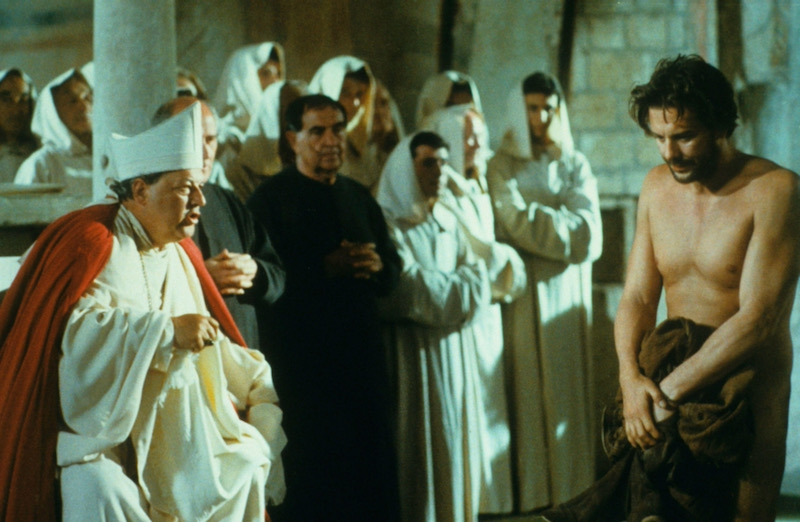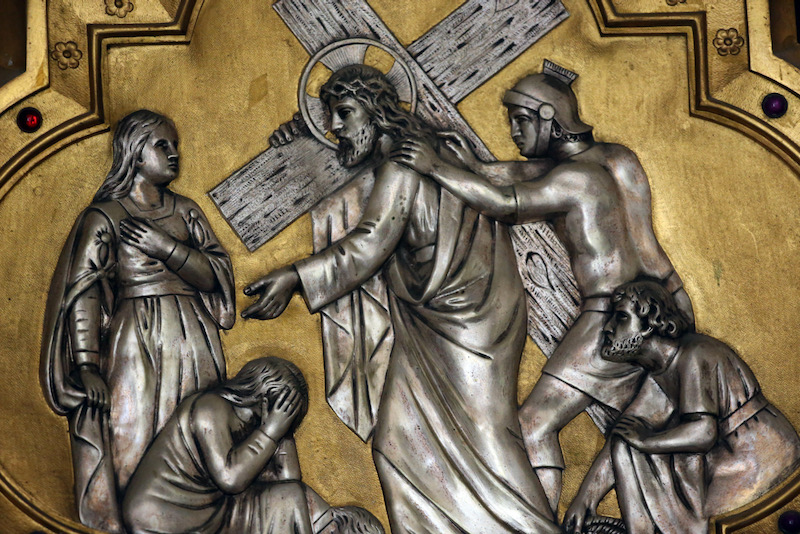In this gospel, Jesus tells us: “No one can come to me, unless he is drawn to me by my Father.” Later, he tells his fearful disciples shortly before his arrest: “No one can come to the Father except through me.” These two conversely related statements are brought together when Jesus says, “The Father and I are one.”
The point of both statements is clear: it isn’t that we come to the Father, but that the Father, through Jesus, comes to us. That is the foundational claim of Christianity, its central truth: that God has become part of his Creation, the Father has drawn near to us. That truth distinguishes Christianity from all religions, and from religion, as such.
But it’s a claim that’s often misunderstood in one of two contrary ways. First, “No one comes to the Father except through me” is often thought to imply that Christianity is the only true religion and thus to justify the dismissal of all the other historic faith traditions, in and through which humankind has sought to reach out to the Transcendent. Or, secondly, it’s taken to imply that Christianity is but one religion among many, inevitably entailing that since different religions offer different and often rival, incompatible revelations, none is true in any absolute sense. How are we to navigate our way between the Scylla of fundamentalism and the Charybdis of relativism?
First, the essential misunderstanding in each of these positions is to think of Christianity as a religion, whether the only true religion or one religion among many other religions. But Christianity’s foundational truth – that God has drawn close to us by becoming part of his creation – distinguishes it from ‘religion’, as such. The historic religions bear witness to humankind’s reaching out to God or the Transcendent: but
Christianity is founded on God’s reaching out to us, in the Incarnation.
Secondly, to say that Jesus is the way to the Father isn’t to impart otherwise unknowable information. Knowing that Jesus is the way to the Father doesn’t dissolve the ineffable mystery which is God: on the contrary, for Christians, God remains permanently an impenetrable mystery. Indeed, knowing Jesus deepens the mystery of God, giving rise, as it does, to the truth, again central to Christianity, that God is a Trinity of personal relationships: another way of saying that God is Love Itself. We hardly understand love as we experience it, let alone the Love that is God Himself.
The gift of faith, in other words, doesn’t ‘decant’, as it were, the mystery of God. On the contrary, faith is the gift of God by which we enter into that mystery which is his life, the grace by which we know that the ultimate mystery of our earthly lives, namely the gift of freely-given love, is the ultimate mystery of the divine life. To have faith, in other words, isn’t to know more than others about God, but to be drawn, by grace, into God, into his own divine life: something we simply cannot do for and of ourselves.
Equally, to have faith isn’t primarily to adopt a particular way of life or to espouse a particular moral code, even. It most certainly entails both of these: but the gift of faith is, primarily, to be made sharers in the life of God, the life which Jesus makes visible in this world. In the human life of Jesus, in everything about his earthly and, indeed, his earthy existence, we see the life of God projected, as it were, onto the screen of human history. (Herbert McCabe)
And what do we see on that screen? Well, in human terms, we certainly don’t see a successful and accomplished, mover and shaker: on the contrary, we see one “despised and rejected of men”, a man who, in worldly terms, is defeated by a cruel political regime and a legalistic religious system. To place our faith is Jesus is, from a human point of view, to place our faith in a crucified failure.
To believe in the Crucified One, therefore, isn’t the mark of an elite, much less a measure of success - not even ‘spiritual’ success (whatever that might be). It is, rather, to know and accept God’s power, wisdom, and love, made visible in Jesus. And in the kind of world that we’ve created, self-giving love, which led inevitably to the Cross (as it will for us, one way and another, if we’re faithful to his way) looks like weakness and ranks as folly.
But in Jesus, we find ourselves not only in the presence of God, but in the presence of a fully human being. In him, we learn for the first time what it is to be human. Sharing the life of God means sharing the love that he has for what he’s created - including ourselves.
And as he accepted the failure of the Cross, so sharing God’s life in Christ makes it possible for us to accept and acknowledge our own weaknesses, neither regretfully nor resentfully, and certainly not complacently, but confidently, in the certain knowledge that one, important measure of sharing God’s life is the readiness with which we accept both failure and forgiveness.
One thing we can be sure of: sharing God’s life in Christ will certainly make us oddballs in the world as we know it. For one thing, it will mean turning aside from worldly notions of success and achievement, by which we’ve all been schooled to judge ourselves and others. We are (and will be) ‘judged’ by one who loves us unconditionally, by the one for whom and by whom we were made. As the Dominican, Simon Tugwell, once put it – with apologies here to vegetarians: we human beings are made for God, as eggs are made for bacon. In Jesus, we find ourselves in the presence of both God and the most human of all human beings: which is why we learn what it is to be and become that for which we were made, only from and in the one by whom we were made.



 Loading ...
Loading ...
What do you think?
You can post as a subscriber user ...
User comments (0)